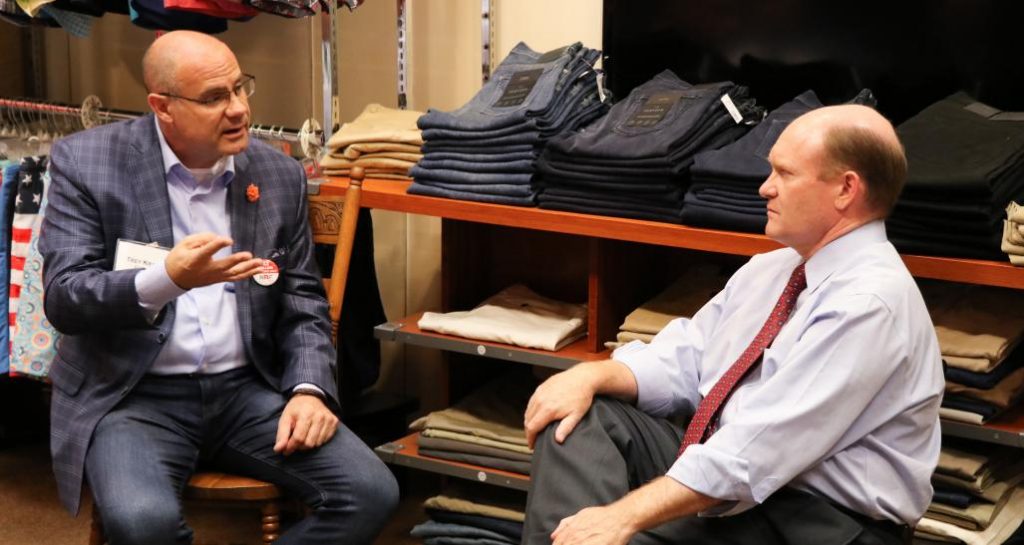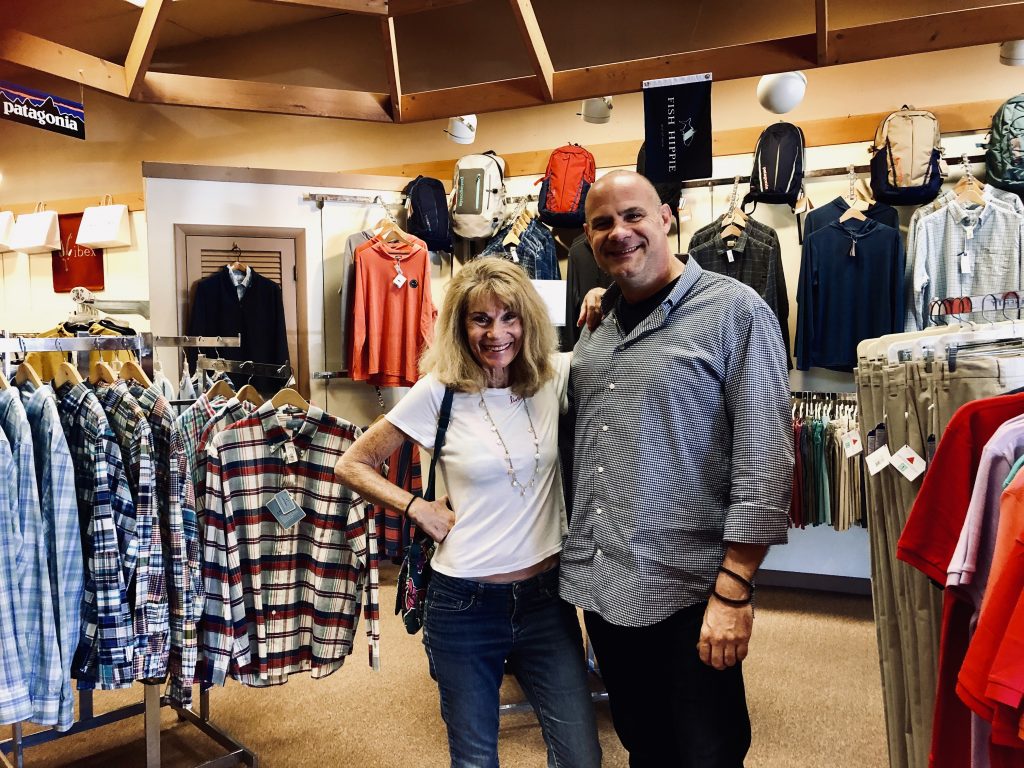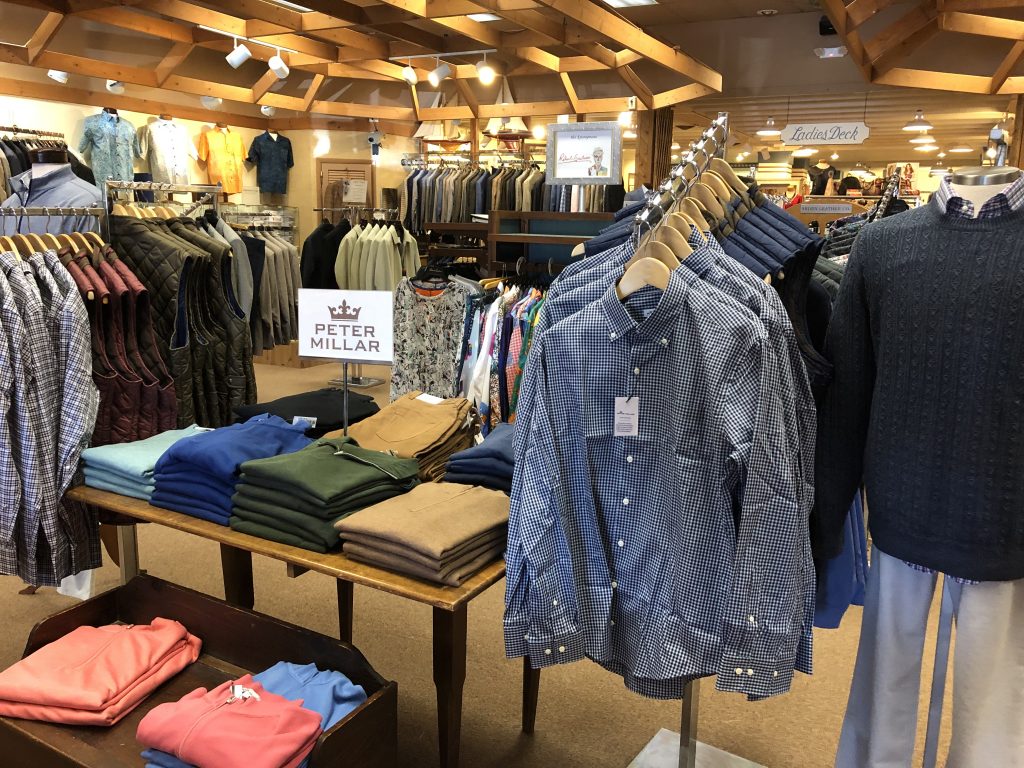TARIFF TALK WITH RETAILER TREY KRAUS


On a beautiful late-August vacation to Rehoboth Beach in Delaware, I had the pleasure of visiting Carltons, a fabulous 7,000 square-foot men’s and women’s apparel store established in 1960. President and co-owner Trey Kraus was on-hand; on his mind—store traffic for the upcoming Labor Day weekend and tariffs on goods from China.
In fact, Kraus and a half dozen other local retailers had just met with Delaware Senator Chris Coons as part of a roundtable sponsored by the National Retail Federation (NRF). All retailers involved spoke of how these tariffs will affect their businesses as new rounds are implemented. According to the NRF, apparel and a wide range of other consumer products were just hit with 15 percent tariffs out of China; another round to take effect December 15 has been postponed but if implemented, these two rounds will cover about $300 billion worth of goods, bringing virtually all items from China under an import tax.
“I want the president to understand that the tariffs are being paid for by the American people,” Kraus said at the roundtable. “All the hard-working people in America are footing the tariff bill and it’s coming out of our pockets and it’s coming out of our business revenues.”

Kraus explained that he has no control over where the apparel he sells is made because he buys from national brands that make their own sourcing decisions — which for most of his goods (about 80 percent) means China. While some brands are looking to move sourcing elsewhere, he noted that doing so is difficult and time-consuming. He also explained how “Made in America” products are also affected since, for example, jeans that are made in L.A. often use fabric from China.
Finally, Kraus told Coons how apparel prices are affected even before the tariffs are put through. His example: a well-known men’s sportswear collection with shirts retailing for $100 has, over the past year, moved up the ticket price to $150 in anticipation of these tariffs.
Coons, a member of the Senate Small Business & Entrepreneurship Committee, was an empathetic listener, stating: “I’m principally concerned about how (tariffs) will impact sales and profitability and inventory for small businesses. I’m concerned about the lack of a clear strategy, a path forward, an off-ramp. How much longer will this tariff standoff with China last and what will the consequences be for small businesses and for their employment and sustainability?”

“My hope is that the Trump administration, President Trump, in particular, will pay attention to voices from all over our country, from farmers to manufacturers to retailers like the ones I’m hearing from today,” Coons continued. “His tariffs that he’s imposing in this trade war with China are having a real and significant impact on our economy and small businesses.”
Coons also noted that “despite what some people say, tariffs are not paid by the Chinese.”
MR thanks Senator Coons for his support of small business and Trey Kraus for being an active retail advocate who also testified with 300 apparel and footwear executives at the U.S. Trade Representative Hearings this past June in Washington, D.C.




For the most part Trey is wrong as is Senator Coons. China is bearing the brunt of the cost of tariffs. This is evidenced by them just devaluing them currency to offset the tariff costs. This means the goods shipped are sent in at a lower price offsetting the tariff increase.
smaller wholesalers and retailers like Carltons may well see price increases, but these companies and retailers are not selling the masses where price is a main factor in the consumer sale. Rather the are already selling product where price is not a primary part of the purchase decision, as shirts for $100.00 and $150.00 are not sold to the masses. Further you likely won’t see price increases for these stores for a year, assuming the tariff increases hold, as everyone has already made their commitments through delivery our past next February.
The companies and factories selling the Macy’s and lower priced retailers like Walmart, Target & Costco, will feel some pinch. Those that are proactive rather than reactive have already started to move production to other countries to sidestep the problem. This also hurts China as they lose business. For this tier of the market the higher you go in price at retail the less units they project to sell so the less they buy. This also hurts China. Prices go up, the retailer buys less of the item. So more often a supplier will work cheaper to accommodate getting the order. Does this effect us in the USA. Yes, but mainly in the corporate profits of those companies. That does not mean they don’t make a profit. just possible a smaller profit, and it generally hurts mostly those at the top of the company.
This is a fight America needs to win, and reading theory from a textbook and promoting that as pure fact to the American people is not being honest. There are areas that can be effected as per textbook theory, but not general consumer retail prices and consumption.